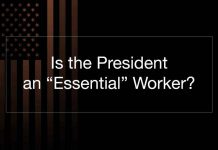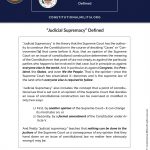Last Updated on October 3, 2021 by Constitutional Militia
In his latest series on “Secession or Declaration of Independence”, particularly Parts 4 and 5, Mr. Timothy Baldwin raises some interesting points.
Unfortunately, he misconstrues my meaning when he attributes to me the notion that (in his words) “as long as the [General G]overnment is executing laws, regulations, restriction, mandates, etc., ‘in the name of doing good’, then such a regime and such acts are not tyrannous regardless of effect”. I thought I had made it clear enough in my commentaries on this subject that, if public officials were actually trying to obey the Constitution (not just going through the motions “in the name of doing good”), their actions would not constitute “tyranny” even if the effects thereof inadvertently might not satisfy with mathematical precision some hyper-technical definition of “the common defence” and “the general Welfare”. This is because there must always be some “play in the gears” for any government to function. Mr. Baldwin, however, seems to contend that any such “play” amounts, at least presumptively, to “tyranny”.
Presumptively may not be the half of it, either. For example, Congress may decide to build a naval base in Norfolk, Virginia, rather than in Savannah, Georgia. If Congress does this in good faith, for sufficient reasons, is it to be condemned because the construction and operation of a base in Norfolk will stimulate the local economy there, but do nothing for Savannah in that regard? Has Congress violated “the general Welfare”, and thereby engaged in “tyranny”, by not building a base in Savannah, too, even though “the common defence” did not require it? According to Mr. Baldwin’s test, perhaps so, because the inevitable “effect” of Congress’s action would be to create economic discrimination between the two cities deriving directly from the location of the base. But every such decision will have such an effect, more or less. To avoid a charge of “tyranny” with respect to “the general Welfare”, then, must Congress build half of the base in Norfolk and half in Savannah, so that each city will share equally in the economic benefits? Yet, if it did so, would Congress not undermine “the common defense” by making neither demi-base sufficient for the Navy’s needs—thereby exposing itself to a charge of “tyranny” with respect to “the common defense”? In situations of this kind, then, are “the general Welfare” and “the common defence” mutually contradictory and antagonistic? Will Congress be committing “tyranny” no matter what it does? Is the Constitution psychotic? Well, if such is the consequence of Mr. Baldwin’s theory, perhaps that theory is overly broad.
Along the same lines, Mr. Baldwin later contends that “[w]here the law does not grant to the government the power to do an act, then the government’s doing that act in contradiction of the law is tyranny”. Again, he overstates the matter. Consider, for example, the following case. The Constitution requires that “[n]o Money shall be drawn from the Treasury, but in Consequence of Appropriations made by Law”. Article I, § 9, cl. 7. Assume that Congress has appropriated “by Law” $1,375,276.00 for some public construction project, to be paid over to a private contractor. By mistake, a clerk causes an electronic check to be drawn on the Treasury for $1,735,276.00 and deposited directly into the contractor’s account. Without noticing the error, the contractor’s accountants start paying the contractor’s employees and suppliers on that project with funds from that account. During the period before the error is discovered and corrected, has the General Government (or the Treasury, or perhaps the clerk) been engaged in “tyranny”? After all, the payment was in excess of the “Appropriation[ ] made by Law”, and therefore was “in contradiction of the law”. And Mr. Baldwin contends that any act of the government (which always entails an act of some public official or employee) “in contradiction of the law is tyranny”. If, however, the posited situation does not entail “tyranny” (as common sense suggests it does not), then Mr. Baldwin’s definition must be flawed.
The evident flaw is Mr. Baldwin’s notion that the intent of the actor is irrelevant to whether his misbehavior can properly be characterized as “tyranny” or not. Now, I believe every violation of a public official’s “Oath or Affirmation, to support th[e] Constitution” (as required by Article VI, cl. 3) should be punishable in some manner. That does not mean, however, that every such violation constitutes “tyranny” and deserves the very same punishment. Consider two cases:
[1] Congress is trying to decide whether to build a new naval base in Norfolk, Virginia, or Savannah, Georgia. The Congressmen in the committee to which the bill is assigned take a light and careless approach to their duties. They fail to study the matter sufficiently. As a result, the committee recommends Savannah, when it should have recommended Norfolk. Based upon that faulty recommendation, the bill passes. Several years later, the mistake is discovered, but by then cannot easily or inexpensively be rectified—meaning that “the common defense” has been compromised. Can this situation, as serious as it may be, be fairly described at any stage as the embodiment or the consequence of “tyranny”? Not, I suggest, without seriously trivializing that word.
[2] Congress is trying to choose among Norfolk, Savannah, and Atlantic City, New Jersey, for a new naval base. Other than being on the ocean, Atlantic City is totally unsuitable. Its harbor is badly configured, its shore facilities are nonexistent, and its civilian infrastructure cannot support a huge influx of servicemen and their families. Nonetheless, the big-money boys behind the local casinos (who anticipate endless windfalls by fleecing spendthrift sailors on leave) and some big contractors in the military-industrial complex (who foresee a gravy train of endless work, building and maintaining a base in such a poor location) suborn enough Congressmen to enact the necessary legislation. The new base is soon recognized as a monstrous boondoggle—but one that the casinos, the contractors, and their puppets in Congress find exceedingly lucrative, both economically and politically. Can this situation, at any stage, be fairly described as the embodiment or the consequence of “tyranny”? Yes, because it exactly fits Locke’s definition, that “[t]yranny * * * is making use of Power one has in his own hands; not for the good of those who are under it, but for his own separate Advantage”.
Now, what is the key difference between these two situations? Why, the intent of the Members of Congress. In the first case, they did not intend to violate the Constitution. Their misbehavior sounded in negligence. Negligence may constitute a violation of their “Oath[s] or Affirmation[s], to support th[e] Constitution”. But it is not “tyranny”. In the second case, the Members of Congress and their clients among the casino- owners and contractors acted in concert, knowingly and willfully, for the very purpose of doing what America’s Founders considered the epitome of “tyranny”.
As a former prosecutor, Mr. Baldwin knows that an actor’s intent often determines the seriousness of his misbehavior, and the appropriate punishment for it. Negligence is not the same as recklessness; and recklessness is not the same as malice aforethought.
America’s Founders were not unaware of those distinctions, either. The Declaration of Independence asserts
[t]hat whenever any Form of Government becomes destructive of these ends [that is, men’s unalienable Rights], it is the Right of the People to alter or to abolish it, and to institute new Government, laying its foundation on such principles and organizing its powers in such form as to them shall seem most likely to effect their Safety and Happiness. Prudence, indeed, will dictate that Governments long established should not be changed for light and transient causes; and accordingly all experience hath shewn, that mankind are more disposed to suffer, while evils are sufferable, than to right themselves by abolishing the forms to which they are accustomed. But when a long train of abuses and usurpations, pursuing invariably the same Object evinces a design to reduce them under absolute Despotism, it is their right, it is their duty, to throw off such Government, and to provide new Guards for their future security.
In this passage, the Declaration either does not accept Mr. Baldwin’s general proposition that “[w]here the law does not grant to the government the power to do an act, then the government’s doing that act in contradiction of the law is tyranny”; or, if it does accept that proposition in principle, it does not recommend that it should be ruthlessly applied in practice in every case. For the Declaration recognizes, under the counsel of Prudence, that “light and transient causes” are not enough to justify altering or abolishing “Governments long established”—obviously, because that course of action may be (and usually is) fraught with political, economic, and social discords, difficulties, dangers, and dislocations far worse than the temporary toleration of “evils [that] are sufferable”. In the category of “light and transient causes” one could surely include public officials’ negligence.
In contrast, the Declaration asserts that “it is the[ People’s] right, it is their duty, to throw off such Government” “when a long train of abuses and usurpations, pursuing invariably the same Object evinces a design to reduce them under absolute Despotism”. That is, when (i) sufficient evidence (“a long train of abuses and usurpations”) (ii) proves the existence of a plan (“a design”) (iii) aimed directly at “tyranny (“absolute Despotism”), the People may and should resist. The evidence supplies the factual basis from which the People can infer the plan. And inasmuch as “design[s]” do not occur in human affairs without the conscious deliberations and choices of human actors, the inference of the plan supplies the basis from which the People can infer the planners’ evil intent. For part two click below.




































